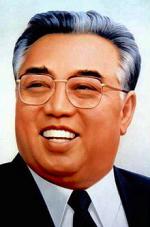Disable ads!
Kim Il-sung
This article contains Korean text. Without proper rendering support, you may see question marks, boxes, or other symbols instead of Hangul and hanja. Korean name Chosŏn'gŭl 김일성 Hancha 金日成 Revised Romanization Gim Il-seong McCune–Reischauer Kim Ilsŏng Birth name Chosŏn'gŭl 김성주 Hancha 金成柱 Revised Romanization Gim Seong-ju McCune–Reischauer Kim Sŏngchu Democratic People's Republic of Korea This article is part of a series on the politics and government of North Korea Constitution Juche (state ideology) Songun ("military-first" policy) Eternal President of the Republic Kim Il-sung Workers' Party First Secretary: Kim Jong-un Congress (6th) Charter Central Committee (6th) Politburo Presidium Secretariat Central Military Commission Chairman: Kim Jong-un Organization and Guidance Department Kim Il-sung Socialist Youth League National Defence Commission First Chairman Kim Jong-un Korean People's Army Supreme Commander: Kim Jong-un Government Cabinet Premier: Pak Pong-ju Judiciary Central Court Legislature President: Kim Yong-nam Presidium Recent elections Parliamentary: 2003 2009 2014 Administrative divisions First-level Provinces Special cities Second-level Third-level Eup (town) Dong (neighbourhood) Ri (village) Rodonjagu (workers' district) Foreign relations Related topics Censorship Human rights Kim dynasty Korean reunification Propaganda Law (Enforcement • Security Ministry) Other countries Atlas Politics portal v t e Kim Il-sung attends a meeting of North Korea Labour Party in 1946. Kim Il-sung (/ˈkɪm ˈɪlˈsʊŋ, ˈsʌŋ/; Korean: [kim ilsʰʌŋ]; born Kim Sŏng-ju; 15 April 1912 – 8 July 1994) was the leader and architect of the Democratic People's Republic of Korea, commonly referred to as North Korea, for 46 years, from its establishment in 1948 until his death in 1994. He held the posts of Prime Minister from 1948 to 1972 and President from 1972 to his death. He was also the leader of the Workers' Party of Korea from 1949 to 1994 (titled as chairman from 1949 to 1966 and as general secretary after 1966). He authorized the invasion of South Korea in 1950, triggering a defense of South Korea by the United Nations led by the United States. A cease-fire in the Korean War was signed on 27 July 1953. His tenure as leader of North Korea was autocratic. Inspired by Stalinism, he established an all-pervasive cult of personality around himself. From the mid-1960s, he promoted his Juche variant of communism, which gradually replaced Marxism–Leninism as the ideology of the state. His son Kim Jong-il became his formal successor at the 6th WPK Congress, and succeeded him in 1994. The North Korean government refers to Kim Il-sung as "The Great Leader" (위대한 수령, widaehan suryŏng) and he is designated in the North Korean constitution as the country's "Eternal President". His birthday is a public holiday in North Korea and is called the "Day of the Sun".
 Read more on wikipedia.org Read more on wikipedia.org
 All quotes by Kim Il-sung All quotes by Kim Il-sung
 Edit Edit
|

|
|
|
|
|
Background photo by Giuliana
|